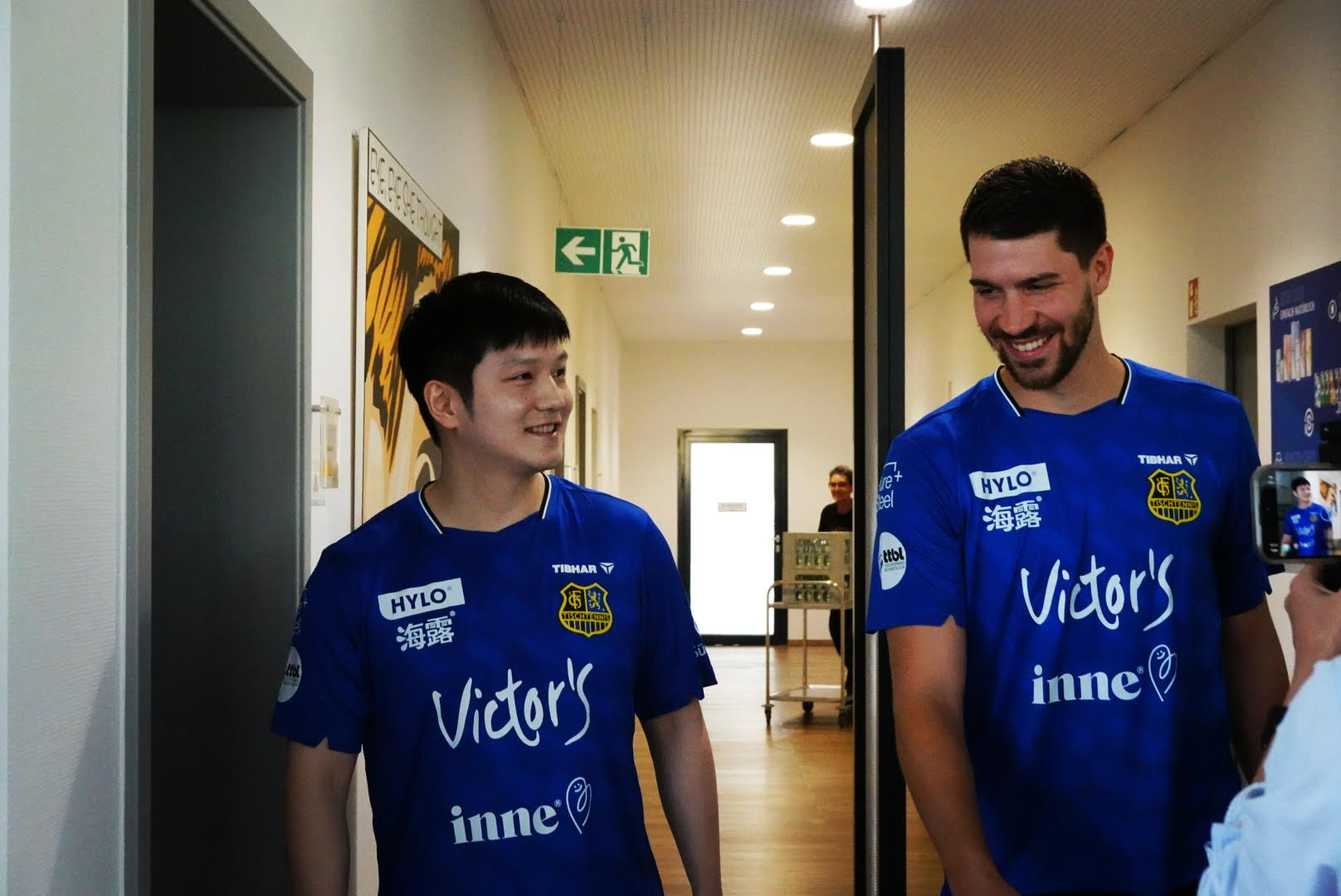
Fan Zhendong and 1. FC Saarbrücken TT Team Captain Patrick Franziska ©Tracy
"Bundesliga" is a term that is both familiar and unfamiliar to Chinese audiences. If you are thinking of FC Bayern München or Eintracht Frankfurt now, we might not be talking about the same “Bundesliga”. However, if the relatively obscure name of “Saarbrücken” comes to your mind, then chances are, you might have just learnt about the Table Tennis Bundesliga due to Fan Zhendong’s recent signing, like me, even though I have lived in Germany for many years.
Founded in 1965, the German Table Tennis Bundesliga (TTBL) is a world's top-tier table tennis competition. Yet, it only enjoys marginal recognition within its home country. Overshadowed by football, the nation's dominant sport, the TTBL, though sharing the same abbreviated name "Bundesliga" with football, operates in a vastly different reality in terms of popularity and commercial success.
The Popularization of Table Tennis in Germany
If you've ever seen the numerous Ping-Pong tables in public areas across most German cities, it might be hard to understand why “niche” remains the consensus of this sport among German table tennis professionals. Germany’s strength in table tennis, powered by world-class stars like Timo Boll, Dimitrij Ovtcharov and their high-profile victories, has certainly captivated audiences in front of screens, but infrequently converted to wide public participation and sustained live viewership.
German national team player Qiu Dang frankly admitted on the point: “Having world-class players has indeed built a good foundation for table tennis in Germany, but the sport isn’t valued the same as it is in Asia…Football, on the other hand, enjoys far more financial support and media coverage, so it is ten times more recognized by the public.”
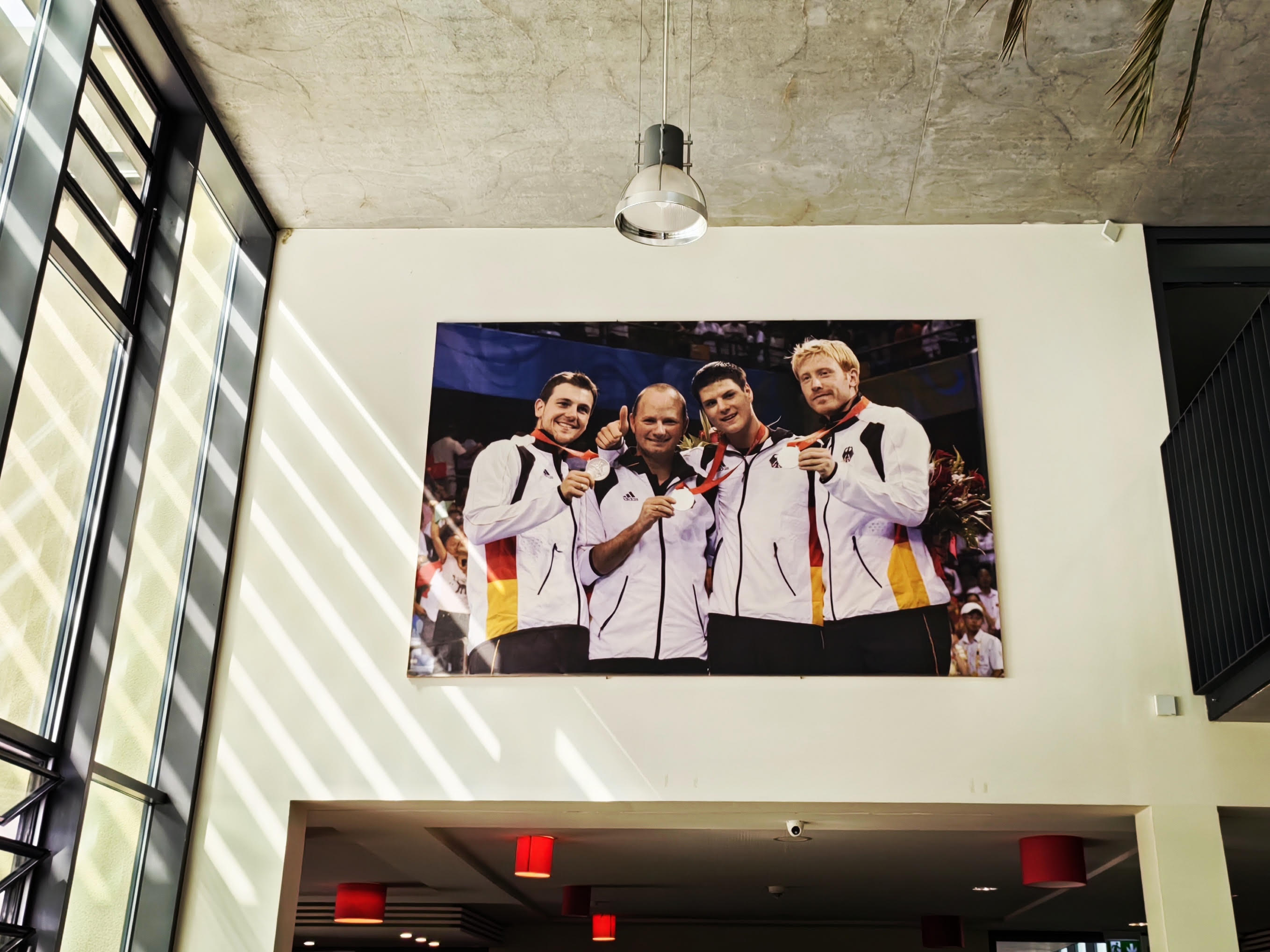
The Hall of German Table Tennis Center in Düsseldorf, Home of Borussia Düsseldorf ©Helen
Just like football, professional table tennis players in Germany are organized and managed through commercial clubs. While unlike football, table tennis clubs attract far less audiences. A particular irony is,that many local table tennis teams consistently outperform their city's football clubs. Take Düsseldorf as an example. Their table tennis team, Borussia Düsseldorf, are an established powerhouses in the sport, which have won the Bundesliga 34 times and have claimed 6 European Champions League titles. In stark contrast, the football team from the same city remains in Germany’s second division. Nevertheless, football matchdays could still draw roaring crowds that turn streets into seas of chanting fans like a World Cup. While when a table tennis match takes place, it’s just another quiet and ordinary day in the city.
The disparity stems partly from differences in the mode of fan interaction, shaped by venue size (hundreds vs. ten thousands) and the nature of the sport (individual vs. team dynamics). But more crucially, it’s the embedded sense of identity in German (and European) football culture. It’s as unlikely to find Real Madrid fans among locals in Barcelona as it is to meet someone from Düsseldorf who doesn’t feel tied to their hometown football team Fortuna. For many Germans, supporting their local team is a seasonal ritual that is carried through generations and a form of regional pride and belonging, regardless of the match results. This isn’t unique to football. Even niche sport like ice hockey benefits from strong regional identity. The Krefeld Pinguine Ice Hockey team for instance, have become a symbol of their city in Germany, drawing massive loyal crowds.
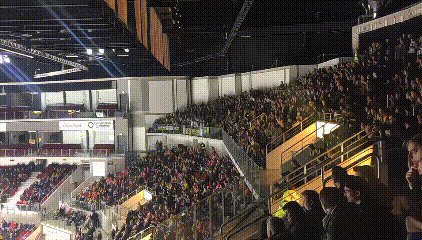
The Home Game Atmosphere of the Krefeld Penguine ©Helen
In contrast, table tennis in Germany misses a comparable cultural narrative rooted in emotional belonging or regional pride. As Alexander Schilling, Managing Director of Borussia Düsseldorf, noted: “Most of our season ticket holders are either dedicated table tennis enthusiasts or families involved in training programs.” As a result, although smaller in scale, German table tennis enjoys a highly knowledgeable and loyal fanbase, with consistently stable attendance across its leagues.
The Commercial Operations of the Table Tennis Clubs
The spectators of football, ice hockey, and table tennis are not necessarily exclusive, but unfortunately, commercial resources are. The small scale of the fanbase of Table Tennis directly leads to limited media coverage, which not only hinders the sport’s popularization but also restricts the commercial development of the clubs.
If you open the homepage of Eurosport, a major sports broadcasting rights holder in Europe, it is hard to find table tennis even under the “Other Sports” category, despite the TTBL season already being underway. As Schilling explains: “mainstream sports channels in Europe reserve most of their airtime for football. Currently, the TTBL is only broadcasted on the paid platform Dyn. This situation leaves most clubs with meager earnings from TV broadcasting fees.
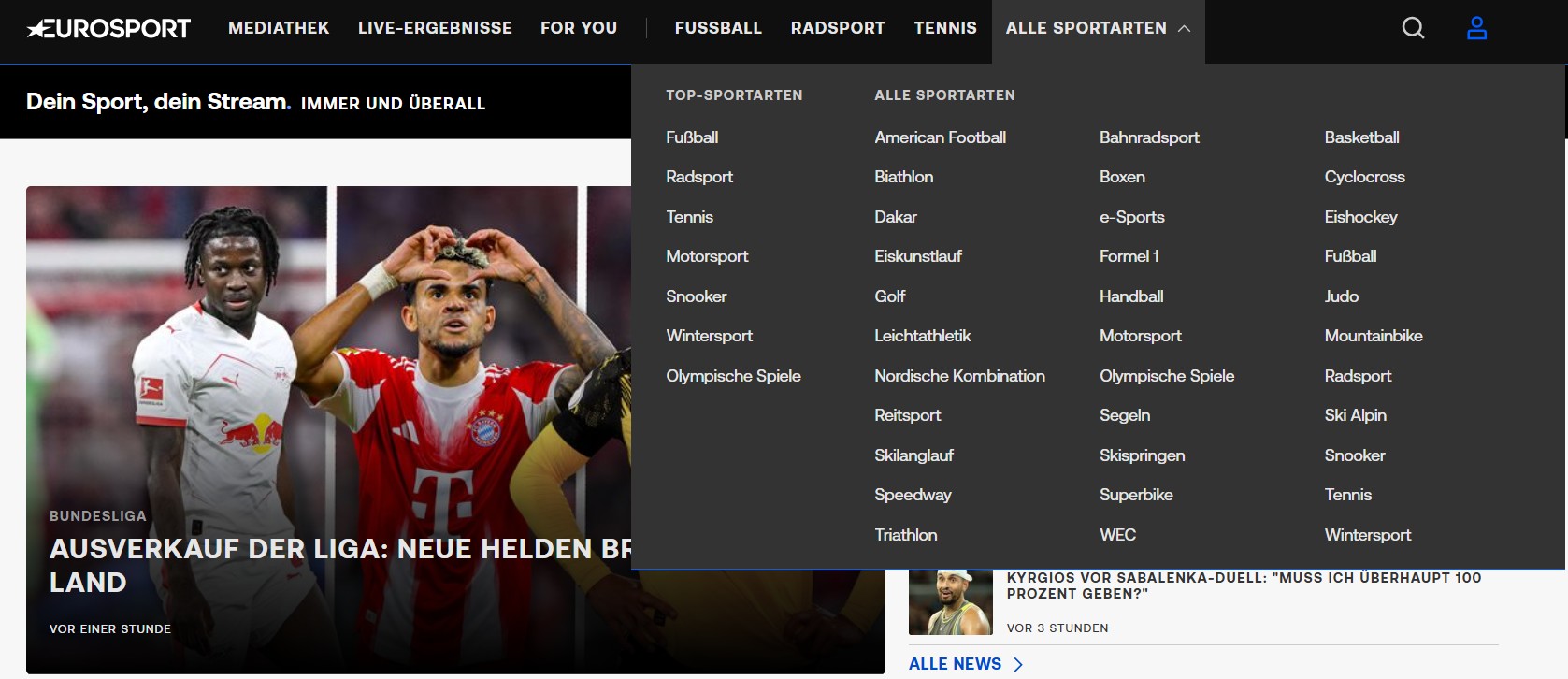
The Screenshot of Eurosport Homepage on 2025.09.03, source: eurosport.de
When it comes to commercial sponsorship, another clear contrast emerges: most football Bundesliga clubs are based in major cities like Munich and Frankfurt, backed by internationally renowned sponsors such as Bayer, Mercedes-Benz, and SAP. On the contrary, many table tennis clubs are located in less-known small cities or towns and attract mostly local sponsors rather than major corporate backers.
Nowadays, the operations of TTBL clubs rely heavily on commercial sponsorship, matchday revenue, and prize money from competitions. This income will not only cover the salaries of players and staff, travel expenses for competitions, but also fund youth training and promotional efforts. Although developing steadily, profitability remains a challenge. In comparison, the top football clubs like FC Bayern München and Borussia Dortmund have already achieved sustained profitability largely through two major revenue streams: TV broadcasting fees and matchday income, let alone the substantial commercial sponsorships and high player transfer fees.
Moreover, in table tennis, affiliations between individual players and national teams outweigh their belonging to the clubs, making it challenging to leverage the fame of star players to enhance brand value of the clubs. Unlike David Beckham, who is instinctively associated with Manchester United (or Real Madrid), or Lionel Messi with FC Barcelona, Timo Boll is primarily linked to the German national team rather than Borussia Düsseldorf, which he represented for 18 years. Additionally, players are permitted to compete for multiple clubs in different leagues, such as the German Bundesliga and the French Pro A, simultaneously. “I have always been against this practice.” says Andreas Preuß, the seasoned club manager who previously signed Jörg Roßkopf, Dimitrij Ovtcharov, and Timo Boll for Borussia Düsseldorf. The comparatively weak association between stars and clubs constrains the extension of commercial value and diminishes the potential for mutual brand reinforcement between players and their clubs.
Yet now, we seem to have a pattern-breaker. The collaboration between 1. FC Saarbrücken-TT (FCS-TT) and Fan Zhendong has generated such a sensational impact that the halo effect was maximized instantly. Almost overnight, a strong brand association formed in the minds of audiences, successfully introducing FCS-TT to table tennis fans across China. According to WeChat Index, searches for “Saarbrücken” (on wechat only) surged by 248,273.03% on June 1, 2025, when Fan’s signing was announced, compared to the previous day. The club’s Weibo followers soared by around 220,000 in mere days. For FCS-TT’s first three matches in the TTBL, ticket sales increased nearly fourfold, prompting the club to add extra seating to accommodate the unprecedented demand. According to the official statistics on the TTBL website, the average number of spectator for FCS-TT’s home matches in the 2023/2024 and 2024/2025 seasons was 304 and 422 respectively. However, the spectators for the first home match of this season reached 1,850, surpassing last season's maximum home match average attendance of 1,223. As well-summerised by SR Fernsehen: “He brought all together, like a magnet.”
The International communication of Table Tennis Sport
The breakthrough of FCS-TT’s table tennis club also fortunate with a perfect timing: When people rush to search for it, they discovered not only its recent double victories in both the Bundesliga and the European Champions League in season 2024/2025, but also a stellar roster featuring German national team player Patrick Franziska and world-class athlete Darko Jorgić, as well as, Truls Möregårdh, the Olympic silver medalist who had just claimed the title at the WTT European Grand Smash. The powerful addition of Fan, completed a lineup that naturally evokes memories of Real Madrid’s “one-galáctico-a-year” era. But this convergence of favorable conditions is nothing accidental but the result of a deliberated operation strategy. Nonetheless, the move to bring in Fan, in particular, was still bold and decisive. This strategy has not only skyrocketed the ticket sales, but has also brought in more sponsors to the club. For example, the newly added sponsor in August, the brand inne® (under MOM'S GARDEN®), also made mention of the club's stellar roster in its press release.
As Preuß reflected, “Clubs in the TTBL have been exploring new approaches in recent years, and FCS-TT’s strategy has made everyone think… It is a new time, and we also must change our mindset. To become a top international club, we need to develop domestic talents, but we also need global super stars.”
FCS-TT's success ripples outward. The participation of Fan has naturally raised the profile of the three major European table tennis competitions (the Bundesliga, the German Cup, and the European Champions League) as well as other participating clubs among Chinese audiences. The sustained excitement online has attracted Chinese broadcasting partnerships from platforms like Youku and Xiaohongshu. This not only creates a new pathway for the club to break through its broadcasting revenue challenge, but also enhances the cross-boarder visibility of European table tennis. It’s worth recalling that in the pre-internet era, it was right the broadcasting of matches that introduced icons like Figo and Zidane, or clubs like Arsenal and Juventus, to audiences oceans away. And what is more important is, that it also creates new sponsorship opportunities and marketing channels for both Chinese brands looking to expand overseas and international brands eyeing on the Chinese market.
The TTBL has demonstrated a trend toward internationalization in recent years, particularly in its outreach to Asian and Chinese markets. Another TTBL club Post SV Mühlhausen previously signed two Chinese national team players Liang Jingkun and Lin Gaoyuan within the same season. Meanwhile, numerous Bundesliga players and clubs have established official accounts on Chinese social media platforms such as Weibo and Xiaohongshu to achieve more frequent interaction. Like Nicolas Barrois, the manager of FCS-TT has hoped (in the interview with TTBL), that the league, partners, and clubs could put the marketing efforts together with the wave, so that the Bundesliga can reach a wider global audience.
The impact also extends far beyond the commercial level. Patrick Franziska, team captain of FCS-TT, told the medias: “Timo Boll, long considered the benchmark of the TTBL, retired this year, and with Fan Zhendong arriving as a new icon, it is very exciting.” Qiu Dang, key player of Borussia Düsseldorf, also expressed his excitement: “We’ve always imagined how it is like to have a Chinese superstar join our league—and now it’s really happening. It’s not just the Chinese fans, the locals here will also catch the opportunities to watch Fan Zhendong play live.” It is worth mentioning that in the first match on the 31st, nearly half of the spectators were Germans or Europeans from nearby countries. Like Barrois stated in the interview with Sport1: ” It would be wonderful if some of this impact remains… when the player eventually no longer plays for us, some of the children who registered because of him will stay. This would allow us to benefit in the future, both in terms of membership strength and youth development.”
Moving away from the star power and focusing solely on the sport itself, Fan Zhendong’s involvement represents an in-depth cross-border exchange of skills. The collision and integration of different techniques and tactics will diversify the game. The frequent high-level competition will raise the overall standard of sport and enhance the spectacle of matches, ultimately engaging more people with table tennis.
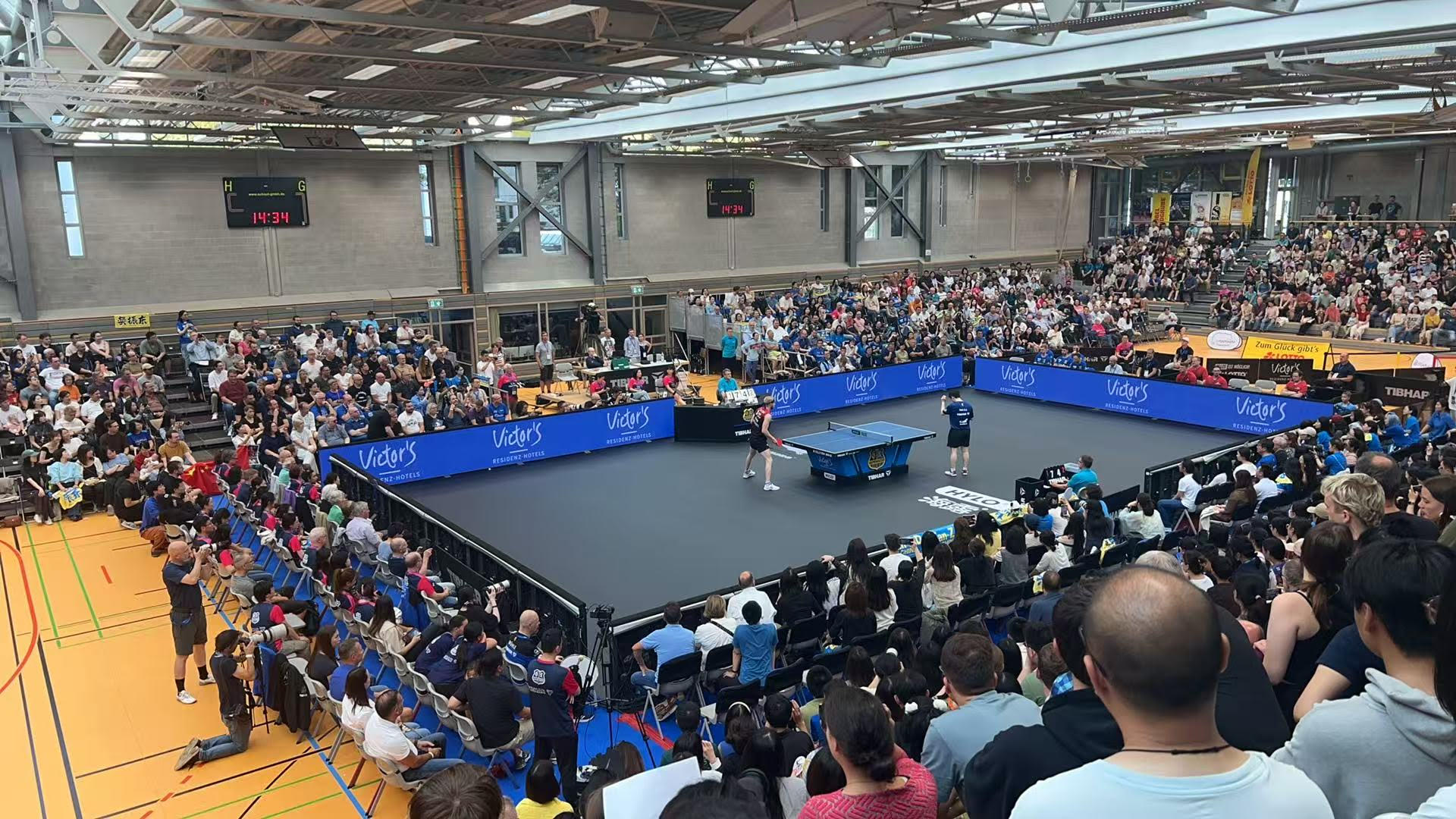
The home match of 1. FC Saarbrücken-TT with TTC Schwalbe Bergneustadt. ©Tracy
The TTBL is globally top-tier in terms of athlete quality and the maturity of its competition system. It boasts an array of world-class players beyond those already mentioned—such as Brazil’s Hugo Calderano, France’s Simon Gauzy, and Sweden’s Anton Källberg etc. , making it one of the most competitive leagues worldwide. Its format, which features a double round-robin home-and-away system followed by playoffs, realises both sporting fairness and commercial appeal. Now, the broadcasting of the TTBL on Chinese platforms certainly marks another milestone in the international exposure of European table tennis. During the live stream of FCS-TT’s opening match on Xiaohongshu, the chat was already buzzing with questions about the league’s structure, players and their signature moves(i.e. Ruiz Strawberry Flick). The post-match warmhearted comments from teammates and rivals, as well as the unique atmosphere of the TTBL are also widely discussed, demonstrating an immediate communicative impact.

While table tennis in Europe may lack the massive fanbase of football or the aristocratic cachet of tennis, and while neither the sport itself nor its club system has formed a strong cultural symbol regionally, we are witnessing how individual athletes can become powerful vehicles of influence. Whether it’s Timo Boll Webcoach, Fan's adventure at TTBL, or the social media accounts of players who interact directly with fans, everyone is leveraging their hard-earned stature to passionately promote the sport they love. Through these efforts, joining forces with clubs, association and leagues, they are helping expand the reach of table tennis and strengthen its entire ecosystem: From talent development to competition structures, from Asia and Europe to the Americas and the Middle East.
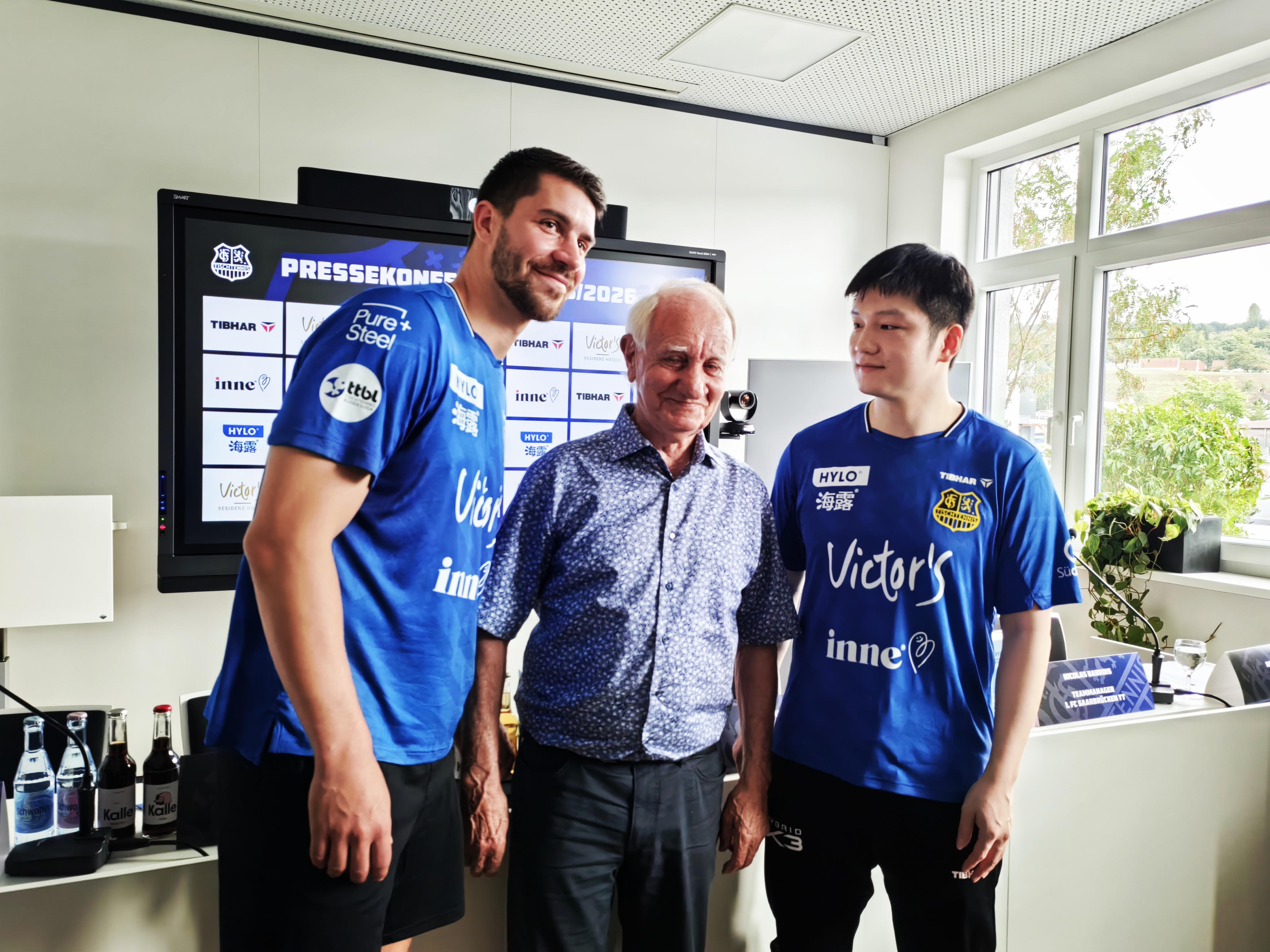
Franziska, Fan Zhendong and former 1. FC Saarbrücken TT player Erwin Berg ©Helen
During my visits, I met three table tennis players: Qiu Dang, Patrick Franziska, and Fan. Away from the intense focus they show on the court, their eyes were sparkling with sincerity, their tones were thoughtful about table tennis, and their smiles were unguarded for the time that they could learn and develop together…those were genuine devotions to their beloved sport that anyone could sense.
At the press conference, when asked about taking challenges in TTBL, Fan replied, “I want to become a better person.” I sincerely hope that table tennis can continue to evolve healthily and maturely around the globe, becoming the fertile ground that nourishes them and empowers everyone who gives their all on the court, to become a better person.
更多精彩内容,关注钛媒体微信号(ID:taimeiti),或者下载钛媒体App

